by John Ansell
Reblogged from here
The ethically-cleansed, ethnically compliant
New Zealand teacher.
The following story made my blood boil.
It needs to be put in front of everyone who cares about the education of our children.
It’s about the cultural brainwashing programme that has turned every New Zealand teacher into a propaganda parrot for primitivism.
It’s the account of a new teacher who, alone in his year group, had the guts to stand up to his training college indoctrinators.
As you may discern from his writing, he’s a highly literate and learned young man. He’s also been a nationally-ranked sportsman.
Yet despite sending his stellar CV to around a hundred New Zealand schools, he was granted the sum total of one interview — and no job.
Forced to conclude that his preference for truth, civilisation and racial equality has made him a pariah to the pinko, pagan-worshipping, West-hating educational elite in his homeland, last Saturday he boarded a plane to go teaching in a country that values his knowledge more highly.
The following are his words. The pictures and captions are mine.
________________________________________
CRITIQUE OF NEW ZEALAND’S
TEACHER TRAINING INSTITUTES
By A Teacher In Exile
As a recent graduate in secondary teaching, I have been invited to share my experiences of the teacher training I received.
I shall describe the cultural indoctrination to which trainee teachers are subjected and the flow-on effect this has on school culture and classroom learning.
I am aware of the risks involved in taking this action (my lecturers and classmates should have little trouble identifying me), but I hope that my example will encourage other teachers (and trainee teachers) to come forth and share their own experiences.
It is important that readers of this blog understand the hoops that trainee teachers are forced to jump through, and the limits on freedom of thought that are imposed from above.
Education has always been the battlefield on which culture wars are fought, and if we are to avoid a future of cultural separatism in this country, it is imperative that we end the systematic indoctrination of teachers and students.
THE INTERVIEW
Before one is accepted into a teacher training programme, it is necessary to attend an interview conducted by the teaching staff.
In every interview, applicants are asked about their relationship to the Treaty of Waitangi, and their loyalty to ‘treaty principles’.
“There is something vaguely inquisitional
about the framing of these questions.”
There is something vaguely inquisitional about the framing of these questions, and suspicion falls upon any applicant who diverts from the official line.
In my interview, I circumvented these questions by declaring myself an internationalist.
(The confused expression on the faces of my left-leaning interviewers betrayed their cognitive dissonance: internationalism used to be a left-wing principle.)
I affirmed that all human beings are members of the human race, and that pigeonholing individuals into sub-groups does more harm than good.
(Further underscoring the contradictions in their own thought, the interviewers agreed with me that pigeonholing Maori is indeed harmful.)
At the conclusion of the interview, I was thanked for my honesty; but as subsequent events would demonstrate, there are limits to how much honesty these people are willing to tolerate.
THE INDUCTION
The first day at a teacher training institute is not unlike one’s first day at school: strange, bewildering and slightly intimidating.
Maori culture is very much to the fore, as Maori songs are learnt and sung, and mihis are taught in special workshops. (We were encouraged to take our mihis into the schools and to deliver them before staff during our placements.)
“This veneer of bicultural identity masks
something much more sinister.”
A trip to a local marae is customary, and in some cases, trainee teachers will stay in the marae overnight. A Maori elder conducts the usual ceremonies and formalities, addressing the trainee teachers in English and Maori.
In my year, the appointed speaker was an affable fellow who officially pronounced us “tangata whenua”. I am not sure what authority he possessed to make this pronouncement, but I very much doubt that it would hold up in the Waitangi Tribunal.
All of this may seem fairly harmless, and even fun, in a naïve, let’s-all-pretend-to-be-Maori kind of way. Many of my classmates certainly viewed it that way.
However, as lectures commenced, it became apparent that this veneer of bicultural identity masks something much more sinister.
‘TREATY PRINCIPLES’ AND THE CURRICULUM
Within our education system, the New Zealand Curriculum enjoys the status of a revealed text, and ‘treaty principles’ constitute the moral code. (Commandments, if you will.)
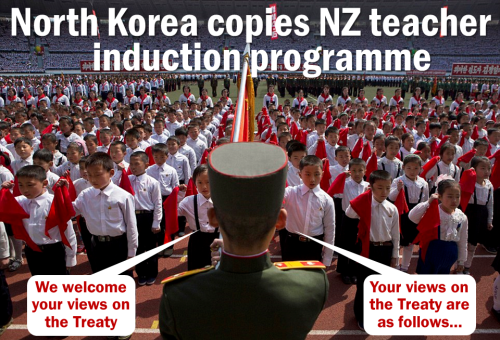
Reminiscent of the worst totalitarian dictatorships,
only trainees prepared to parrot the state’s primitivist
dogma are permitted to teach New Zealand children.
In innumerable essays that are written throughout the year, trainee teachers must refer back to the New Zealand Curriculum and endorse the Vision, Principles, Values, Key Competencies and Pedagogy contained within.
References to ‘treaty principles’ abound in these sections of the curriculum.
Under Principles, it is stated that
“The curriculum acknowledges the principles of the Treaty of Waitangi and the bicultural foundations of Aotearoa New Zealand.”
The Vision is defined as one in which
“young people work to create an Aotearoa New Zealand in which Maori and Pakeha recognise each other as full Treaty partners.”
And it is further claimed that the curriculum
“will help schools give effect to the partnership that is at the core of our nation’s founding document.”
Woe betide any trainee teacher who points out that the word ‘partnership’ does not appear in the Treaty of Waitangi.
[Or that the Principles of the Treaty were invented in 1989, and the name ‘Aotearoa New Zealand’ relatively recently. (The Maori name for New Zealand in 1840, and until well into the 20th century, was Nu Tirani). — JA]PROTECTION OF THE MAORI LANGUAGE
The New Zealand Curriculum asserts that
“all students will have the opportunity to acquire some knowledge of Maori language and culture.”
A supporting document produced by the NZ Teachers Council – the New Zealand Graduating Teacher Standards – sets out the following condition:
“graduating teachers are required to have knowledge of tikanga and te reo Maori to work effectively within the bicultural contexts of Aotearoa New Zealand.”
The Maorification of tag.
In written essays, trainee teachers must provide examples of how they will incorporate Maori language (and concepts) into their lessons.
In one of my set readings, it was argued that the tag game “stuck-in-the-mud” throws up
“an opportunity to be culturally inclusive (partnership) by providing the vehicle to openly discuss (participation) sensitivities such as tapu(sacredness) and in doing so acknowledges the nexus between Maori and Pakeha.”
Scholarly writing of such low-level, cringe-making quality is typical of many of the texts that trainee teachers are forced to read and to quote from.
I also remember having to respond to an article advocating the compulsory teaching of te reo Maori.
BISHOP OF WAIKATO
Woolly-woofterism at its wacky Waikatoey worst.
The three ‘R’s that are taught in our teacher training institutes are ‘Read,’ ‘Revere’ and ‘Regurgitate’.
This is especially true in the case of Waikato University Professor of Maori Education Russell Bishop: a crashing charlatan whose academic output is a staple of the current teacher training programmes.
Every trainee teacher must study Bishop’s ‘Culturally Responsive Pedagogy of Relations,’ which informs both the Te Kotahitanga Effective Teaching Profile and theTataiako Cultural Competencies for Teachers of Maori Learners document.
Bishop claims that the guiding idea of his life’s work is encapsulated in the following quote:
“This then is the great humanistic and historical task of the oppressed: to liberate themselves and their oppressors as well.
The oppressors, who oppress, exploit and rape by virtue of their power, cannot find in this power the strength to liberate either the oppressed or themselves.
Only power that springs from the weakness of the oppressed will be sufficiently strong to free both.”
– Paolo Freire
And who pays this Bishop for his sopping wet sermons?
You do.
In essence, Bishop’s contribution is the development of a race-based pedagogy built around a series of Maori metaphors.
It posits that Maori students learn differently from their non-Maori peers, and must therefore be taught differently: “as culturally-located human beings.”
Educational underachievement among Maori is attributed to negative student-teacher relations, and something called ‘deficit theory’: low expectations of Maori learners based on negative cultural stereotypes.
Echoing Paolo Freire’s great insight, Bishop coined the following slogan for his culturally-responsive pedagogy:
“what is good for everyone is not always good for Maori; but what is good for Maori is good for everyone.”
(Could the subtext be any more obvious?)
As I would learn, anybody who dares to challenge this kind of sophistry is soon brought to heel.
The following story clearly demonstrates that one must subscribe to a race-based political ideology if one is to have any hope of gaining teacher registration in New Zealand.
QUASHING DISSENT
One of the essays that I had to write concerned the ‘roles and responsibilities of teachers and learners in the New Zealand classroom.’
The learning outcomes for this essay centred on biculturalism, te reo Maori and the historical, political, social and cultural influences on New Zealand schools.
Failure to satisfy the requirements for any one of these learning outcomes would necessitate a re-submission, and failure on the second attempt would mean failure for the course.
Frustrated by the indoctrination to which I had been subjected, I wrote critically about many of the issues we were expected to cover.
My intention was not to be provocative or incendiary, but to assess the issues in an objective, thoughtful and reasoned way.
When my essay was returned to me, I was shocked to discover that I had been given the lowest possible grade.
Even more distressing were the spiteful comments that appeared in the margin of my essay, accusing me of “monocultural ignorance” and of being “patronizing.”
The marker’s tone was defensive and censorial, as if I had no right to hold the views that I had expressed.
What follows is an excerpt from my essay in which I critically evaluate the TataiakoCultural Competencies.
“The Tataiako Cultural Competencies for Teachers of Maori Learnersdocument lays out a number of competencies that teachers should aim to achieve:
- Wananga: participating with learners and communities
- Whanaungatanga: actively engaging in respectful relationships with Maori learners, parents and whanau, hapu, iwi and the Maori community
- Manaakitanga: showing integrity, sincerity and respect towards Maori beliefs, language and culture
- Tangata Whenuatanga: affirming Maori learners as Maori
- Ako: taking responsibility for their own learning and that of Maori learners
Though articulated with specific reference to Maori, one would like to believe that these cultural competencies are reducible to basic moral principles that are in fact universal.
Any decent, fair-minded, morally functional human being ought to know instinctively how to treat somebody of another culture; it would be an insult to our integrity to suggest otherwise.
Certainly, there is much in the Tataiako document of a highly questionable nature – nebulous language that conceals some very woolly thinking.
The glorification of Maori knowledge, and the attendant accusation against ‘Eurocentric’ education, should be taken with a grain of salt.
We should take heed of the request by the Maori petitioners to share with their young the fruits and the glories of Western learning.
These Maori elders understood the value of reason, science and Enlightenment principles, and they understood that a retreat into primitivism, tribalism and superstition would be detrimental to the Maori people.
As teachers, we may have a duty to people, or groups of people, but we also have a duty to truth, and to neglect this duty would be a supreme act of cowardice.”
A heretical suggestion which the examiner
forced the brave trainee teacher to rewrite.
In the margin beside this paragraph, the marker comments:
“I think you are on questionable ground yourself here, and once again your tone implies a monocultural ignorance.”
When I complained to the Programme Leader that I had been penalised for holding contrarian views, and that the department was not upholding the university’s policy of freedom of thought, she defended her colleague in casuistic fashion:
“My reading of your assignment and [the marker’s] comments was that [the marker] was at times offering a different perspective from yours.
Staff are mindful that this programme serves as a preparation for teaching, and that our graduates must be able to meet the graduating teaching standards, and therefore on occasions do provide a different point of view.”
(Note the way that she cloaks this statement of mandatory compliance in the language of diversity and relativism.)
My essay was re-marked by another staff member, who faulted me for not “discussing the place of te reo Maori or tikanga in either science or English,” and for using “emotive language” in the phrase “the fruits and glories of Western learning.”
Of course much of te reo Maori
is simply Maorified English.
The grotesque quest for cultural relativity.
I was forced to resubmit the essay, exactly as they wanted it, expunged of all signs of a critical intellect.
It is a terrible thing to be conscripted into writing something that you do not believe, and for this to occur in a university environment is completely unacceptable.
All New Zealand teachers must be certified
culturally safe by the Treatifarian Thought Police.
THE SILENT MAJORITY
As far as I know, I was the only trainee teacher in my year to clash with the department over an ideological difference of opinion.
I know from conversation with my classmates that there were others who shared my misgivings about biculturalism and treaty principles, but in essays and online forums, these people were happy to toe the treaty line.
Given the time and money that they had invested in the teacher training programme, it is perhaps understandable that they should have acquiesced in the propaganda.
Most of them were simply focused on passing the course so that they could enter the teaching profession and establish a career.
But what I always found so appalling was the ease and complacency with which my classmates collaborated with the establishment.
They were willing to overlook the systematic indoctrination, and their complicity caused them no compunction.
They acted without regard for the integrity of our education system, and without regard for the educational opportunities of our young learners.
If these people were really invested in the future of our country, its people and its schools, they should have felt much more inclined to stick their necks out.
When we were invited to respond to an article advocating the compulsory teaching of te reo Maori in an online forum, I was the only respondent to reject the proposal.
During a unit of our course on the Treaty of Waitangi, I posted a link to David Round’s treaty-related essays and encouraged my classmates to examine the other side of the argument.
Not a soul responded to that thread, but one of my classmates later described my action as “extremely stupid.”
Cowardice and passivity of this kind cannot be sufficiently condemned.
It is the complicity of trainee teachers that has perpetuated the problems in our education system – and yet this state of affairs is entirely avoidable.
Student teachers: will you join the resistance?
If trainee teachers put up even the slightest resistance, there is no way that teacher training programmes could continue in their present form.
But year after year, no one speaks out.
Let us not forget that Dante reserved one of the fieriest corners of his inferno for those who, in a time of moral crisis, try to stay neutral.
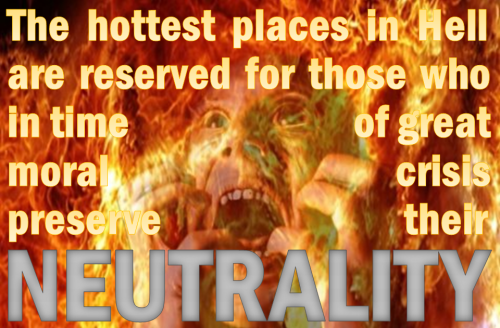
President John F Kennedy paraphrasing Dante.
SCHOOL CULTURE AND CLASSROOM LEARNING
Placements provide trainee teachers with an opportunity to gain practical teaching experience within a variety of host schools.
They also provide illuminating case studies in how the perverse ideas propagated by our teacher training institutes infect school culture and classroom learning.
New Zealand’s cultural indoctrination system
would make a communist dictator proud.
What I observed during my placements were the manifestations of cultural indoctrination, made possible by the acquiescence of school staff and the suspension of their critical faculties.
Treaty principles, it seemed, were not only entrenched in our national curriculum, but also in the minds of our teachers and principals.
Visit almost any school website nowadays and you will find a statement of allegiance to the principles of the Treaty of Waitangi.
If you then click open the school’s ERO report, you are likely to find a recommendation that the school takes steps to raise Maori achievement levels.
From my experience during placements, I noted a general fixation with Maori and treaty issues in professional development programmes.
In the space of two weeks, I attended four professional development seminars, and issues relating to Maori education were covered in each one.
I listened in disbelief to a one-hour presentation on how primitive Maori sacrifice rituals could be incorporated into the study of The Hunger Games in order to better serve Maori learners.
(And this was at a predominantly white school in a predominantly white area of New Zealand.)
Maori learners could read ‘This Horrid Practice’
to see how their precolonial forebears staved off
hunger. But how would that serve them?
The Tataiako Cultural Competencies for Teachers of Maori Learners document was specifically designed for professional development, and there is a constant push to ‘deepen’ teachers’ understanding of the Treaty of Waitangi.
The real tragedy is when treaty principles encroach on classroom learning.
I am young enough to remember being exposed to an inordinate amount of bicultural literature as part of my high school English education.
Nowadays, students do not study Bruce Mason’s The Pohutukawa Tree, but New Zealand’s highest grossing film, Boy.
(This is what it means to ‘cater to Maori needs’ and to ‘include a Maori perspective.’)
Resources that have been developed by the Ministry of Education for teaching the Treaty of Waitangi are widely used in Social Studies classes, propagandizing treaty lies, and brainwashing the younger generation.
I visited one school where male students were forced to participate in an inter-house haka competition.
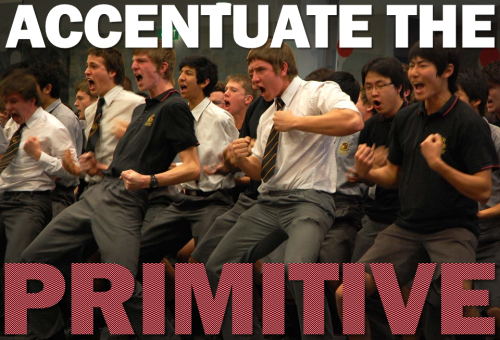
How is it that in a civilised country where
violence is “not OK”, it is OK to stage contests forcing
boys to rage like savages in the name of “culture”?
At the same school, a ‘He Kakano’ initiative to introduce more Maori iconography around New Zealand schools was greeted with rapturous enthusiasm.
I even heard it rumoured that the NZQA was going to introduce an achievement standard for cooking hangis in Home Economics.
THE MYTH AND THE MYTHMAKERS
There seems to be a general attitude among teachers and principals that uniting students under a common Maori banner has a positive effect on school culture: group identity enforces group belonging, gives weight to a shared vision, and if properly manipulated, promotes social order and cohesion.
Modern history provides ample examples of how those in power have created identity myths to mobilise people in pursuit of their own political ends.
We would do well, therefore, to question the myth that is being foisted on our student population, and to question the motivations of those who have prescribed that myth.
Maori culture, by which our education system now defines itself, is a primitive culture. Primitivism represents an early phase of human development, long before mankind had achieved civilisation.
Primitivism is not preferable to civilisation, and it is folly to pretend otherwise. Civilisation has elevated our minds and refined our nature; primitivism bears the stamp of our lowly origins.
What sort of education system accentuates
the primitive and eliminates the sensitive?
The ‘anarchy of instincts’ made manifest in the haka stands in symbolic relations to the mode of existence from which it sprang. To promote such barbaric practices is to turn the mind away from nobler forms of expression, and to shut out the airs of heaven.
It is anti-intellectual, and it militates against education.
New Zealand’s Samantha Powell representing
our supposedly peace-loving nation at the
Miss Universe pageant in Vietnam in 2008.
Refashioning our schools with Maori iconography to reflect the primitive mind will also have a barbarising effect. As one early European visitor to New Zealand described the Maori aesthetic: “it is all gargoyles and no angels.”
What other nation on Earth
prioritises barbarity over beauty?
The reorientation of our national curriculum towards biculturalism and ‘treaty principles’ reflects a political agenda to enshrine Maori language and culture, and to move New Zealand towards co-governance.
In taking it upon themselves to determine the identity of our nation, the NZ Teachers Council and the Ministry of Education have also been motivated by their own vanity.
They have no business dictating to us what our culture should be, and it is arrogant of them to claim this right.
CULTURALISM AND ITS CONSEQUENCES
Culturalism is defined as the ideology of ethnic politics.
A key feature of the culturalist enterprise is the fetishization of difference, such that ethnic identity assumes almost sacred value.
In a particularly revealing line from our national curriculum, it is argued:
“By understanding and using te reo Maori, New Zealanders become more aware of the role played by the indigenous language and culture in defining and asserting our point of difference in the wider world.”
While it is true that Maori culture sets us apart from the rest of the world, it is worth considering the effects of fetishizing this ‘point of difference.’
By extolling a culture simply in virtue of being different, culturalists encourage pernicious forms of relativism and tribalistic habits of mind.
This is quite evident among prominent Maori leaders such as Margaret Mutu and Annette Sykes. Convinced of their own uniqueness, they divorce themselves from the rest of the human race, and retreat into their own narrow world of Maoridom.
Annette Sykes and Margaret Mutu.
Regrettably, I observe the same tendency in the younger generation of Maori who have been indoctrinated into thinking that they, too, are different.
We would better serve Maori students if we stressed commonality among races and encouraged an internationalist perspective.
A disturbing feature of culturalism in education is that it breaks down the essential distinction between local knowledge, acquired at home, and disciplinary knowledge, acquired at school.
Disciplinary knowledge is based on objective truth and universal principles. It broadens the mind by taking students beyond themselves and beyond their immediate environment.
The culturalist approach of making ethnicity relevant to classroom learning undermines disciplinary knowledge and cuts students off from the international community.
This is especially true in the exciting new era of online education where the proliferation of MOOCs (Massive Open Online Courses) and websites like the ‘Khan Academy,’ are democratizing knowledge like never before.
The influence of these resources is set to grow, bringing the best teachers in the world to the widest possible audience, and creating a level playing field for all students.
Online education is reinforcing the primacy of disciplinary knowledge and accelerating a linguistic convergence towards the language of academia, English.
CULTURE: A BETTER ALTERNATIVE
The culturalists are right about one thing: culture really does matter.
But culture (the noble pursuit of truth, wisdom and beauty) should never be confused with culturalism (the reification of ethnicity).
Educators need to learn the difference.
To illustrate this point, we might compare the Renaissance movements in both European and Maori history.
The European Renaissance involved looking outward to acquire new learning; the Maori Renaissance involved looking inward to advance a political cause.
So why is it that our schools teach the latter to the exclusion of the former?
An education system that is committed to culture, as opposed to culturalism, should reflect the humanist ideals of the European Renaissance.
It should pass on “the best that has been said and thought,” and not tailor learning to specific ethnic groups.
Western learning represents a high-water mark in the history of mankind, and this is why it dominates school (and university) curriculums.
In other parts of the world, people have embraced our intellectual traditions, and increasingly, they are beating us at our own game. Like all serious-minded people, they understand that “we see further because we stand on the shoulders of giants.”
One woman who benefited from an education in culture is Dame Kiri Te Kanawa.
She stands as an example to her people (and to the New Zealand education system) of what Maori can achieve if they aspire to excellence on a global stage.
What would she make of Russell Bishop’s ‘Culturally Responsive Pedagogy of Relations’?
And how might her life have unfolded had she been taken aside at school and told that she learnt differently from her non-Maori peers?
The race that counts is the human race.
Dame Kiri Te Kanawa succeeded not because she was treated differently from others but because she was treated the same.
She was also given the best that our culture can offer, and students deserve nothing less.
WHAT THEN MUST WE DO?
As New Zealand’s educational ranking continues to slide in international tables, the National Party rolls out managerial solutions and promises more money for teachers.
No politician has dared to question what is being taught in our classrooms, what is being taught in our teacher training institutes, and what is being prescribed by our national curriculum.
If our education system is to regain its credibility, there must be a return to disciplinary knowledge and an end to culturalist influence.
(If we require a model, the British Secretary of Education, Michael Gove, has executed precisely these moves in the past two years, rewriting both the History and the English high school curriculums.)
‘Treaty principles’ must be removed from our national curriculum and the cultural indoctrination of students and teachers must cease. The ‘cult of biculturalism’ is wasting teachers’ precious time, and it is producing mind rot in the classroom.
If everyone who reads this post sends the link
to every teacher and trainee teacher they know,
the debate will snowball and a hero will emerge.
In this post, I have provided my own personal account of the teacher training that I received.
Every teacher has his/her own story about cultural indoctrination in our schools and teacher training institutes.
I encourage all members of my profession to share their stories of ‘treaty absurdity’ by leaving a comment below.
A lone voice has little force in this context, but if we can catalogue our concerns and describe our experiences, we may create the groundswell of opposition that is so desperately needed.
____________________________________
Now back to me, the blog owner. I thank A Teacher In Exile for sending me his story. I’m proud to post it.
I share his hope that other teachers will now come forward with their own stories. Please urge them to do so.
Tell them that even their anonymous accounts, added together, will apply crucial pressure to the propaganda parrot trainers. With enough pressure to tell the truth, these habitual liars will have no choice but to back down.
So let’s get debate raging in staffrooms up and down the land. Send this to everyone you know in education. Every principal. Every Education Ministry employee. Every teacher
Ask every trainee teacher, ‘Do you have a noble ambition to inspire our children with “the best that has been said and thought”? Or will you be content to be a propaganda parrot for the state?’
In the war of ideas between civilisation and primitivism, there is no more important battleground than the nation’s classrooms.
If you’re a teacher or trainee teacher and you really do want to make a difference to New Zealand, our children, and generations yet unborn, need you to stand up now.
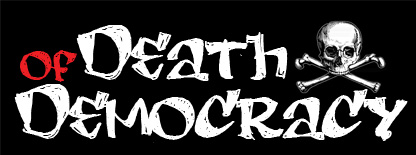
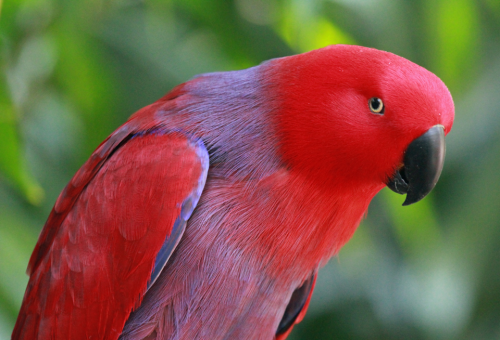
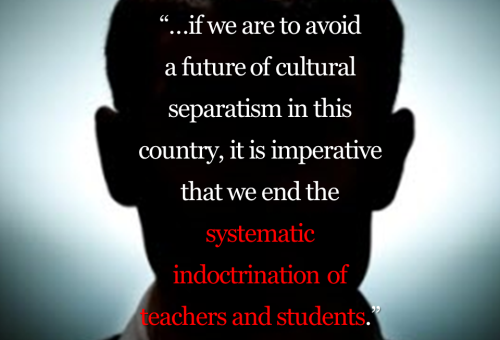
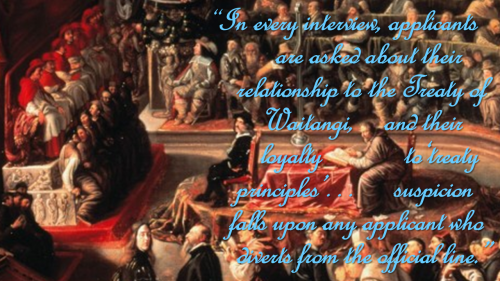
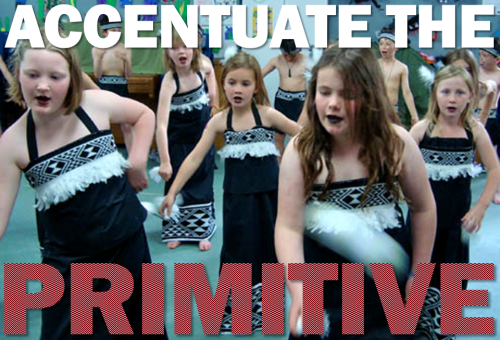
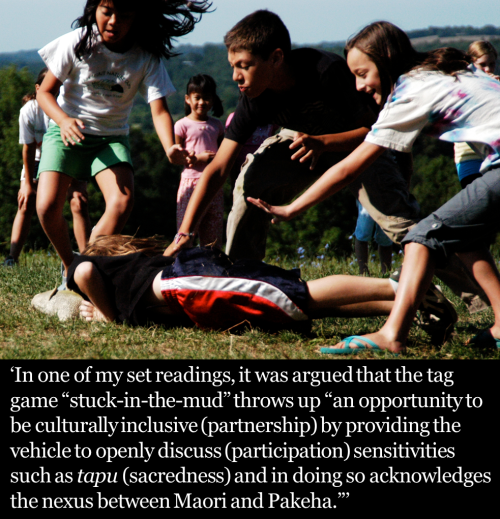
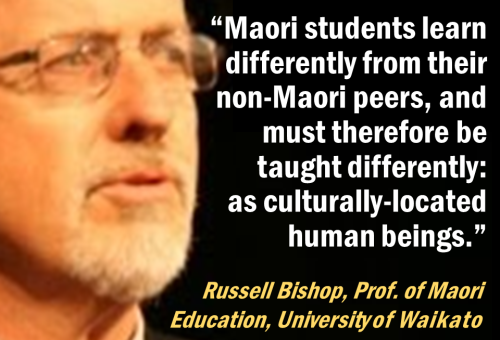
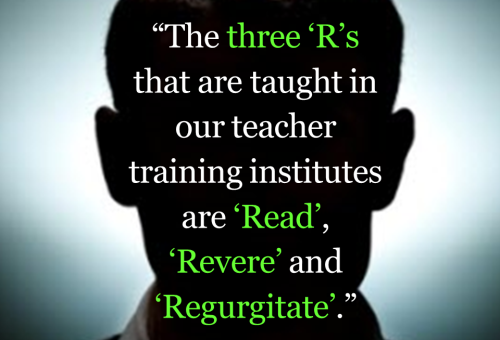
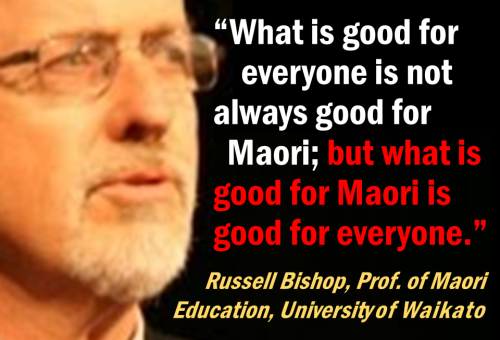
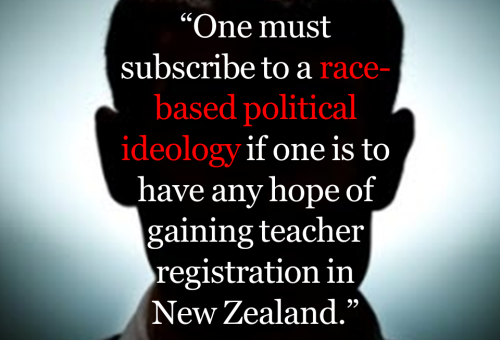
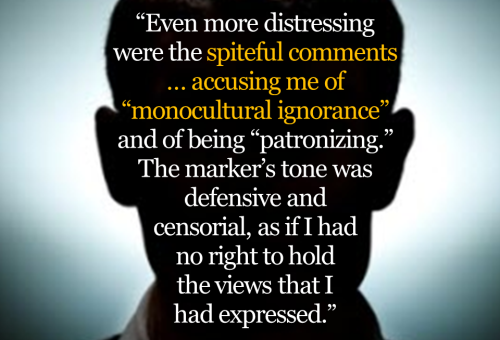
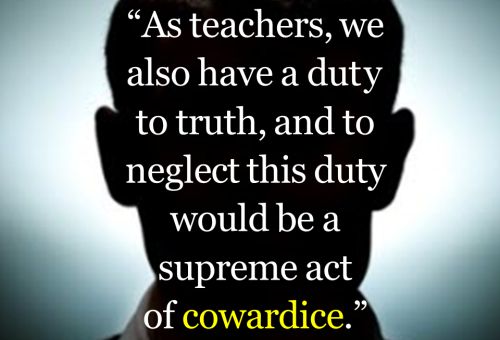
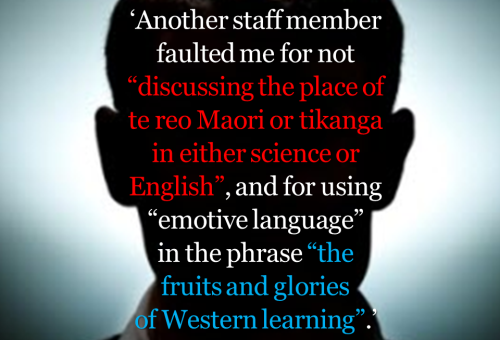
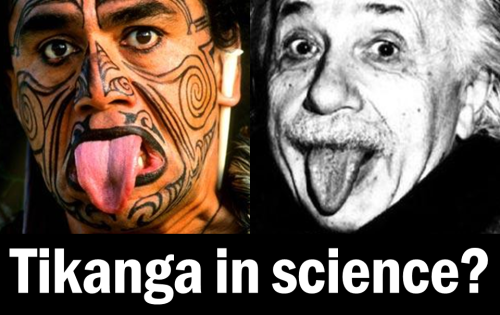
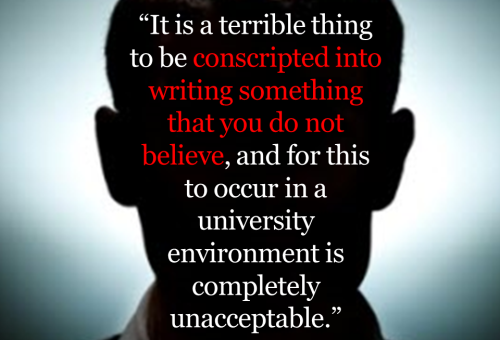
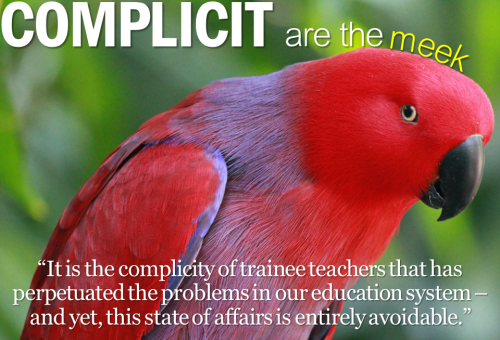

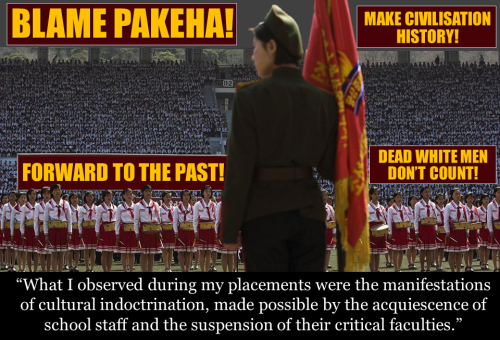
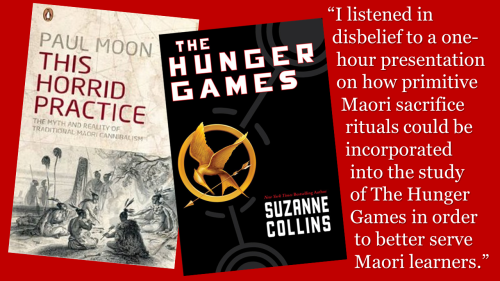
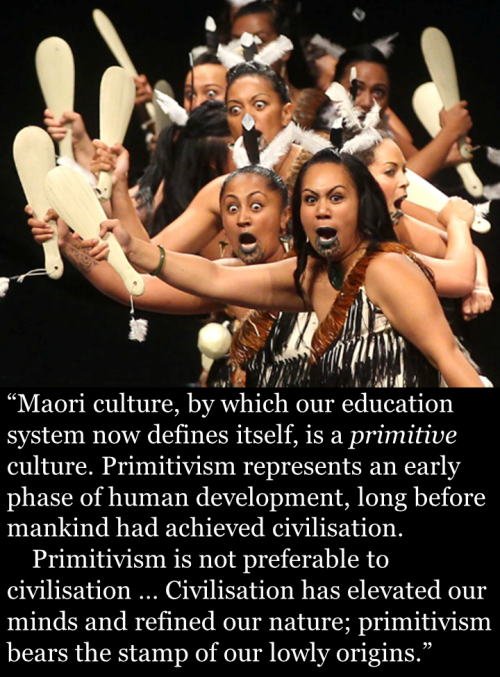
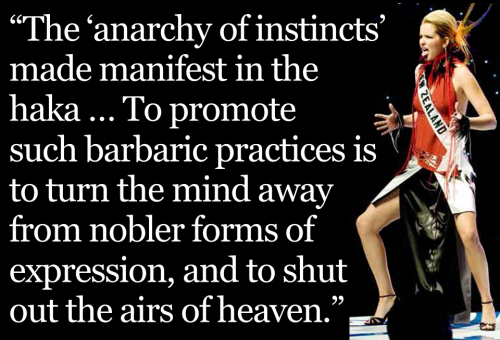
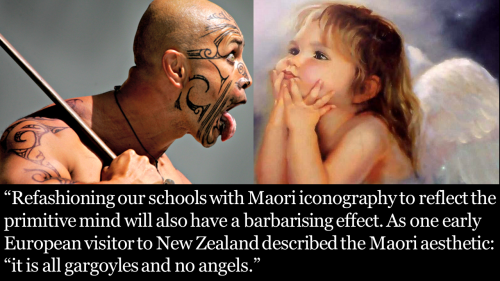
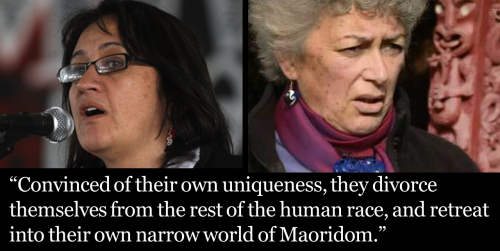
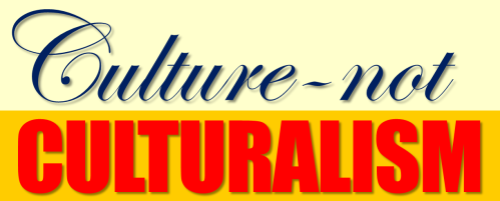
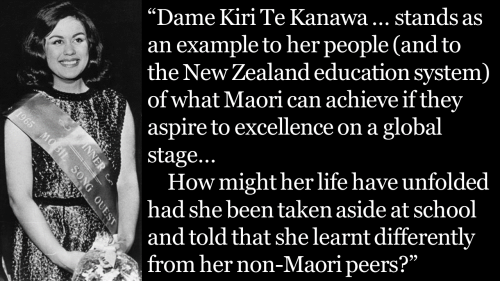
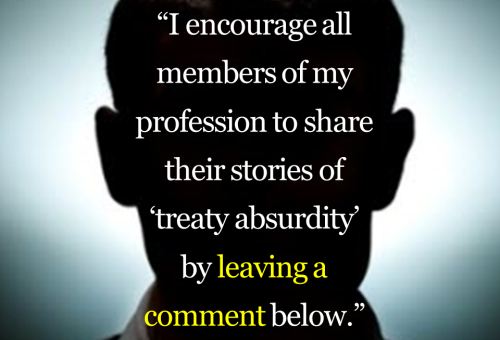
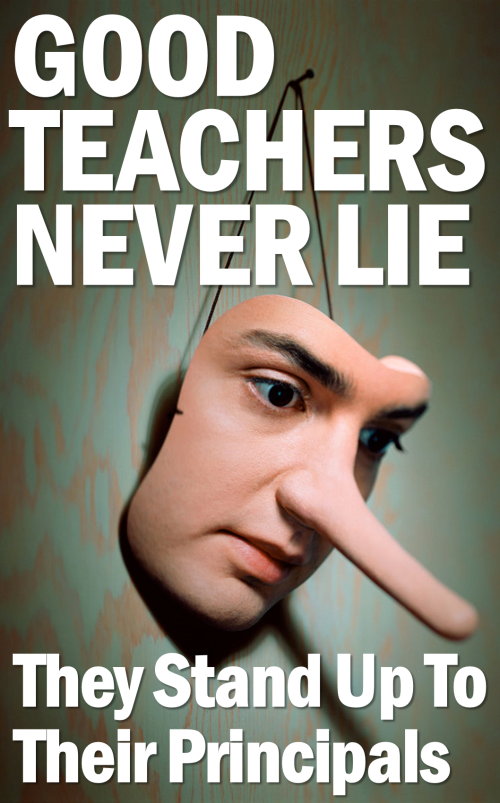






Leave a Reply
You must be logged in to post a comment.